World leaders must act as “ringmasters” to transition the global economy away from fossil fuels in order to combat the supposed impending doom of climate change, the United Nation’s top climate scientist has argued.
Professor Jim Skea, who was recently installed as the chairman of the Intergovernmental Panel on Climate Change (IPCC), the top UN body on climate change science, said that political leaders need to act as the “ringmasters or ringmistresses” of ushering in the globalist green agenda and force people into shifting away from a fossil fuel-based economy.
Speaking to London’s Evening Standard newspaper, Skea said that climate needs a “society-wide” effort, but said that “political leaders have a particular responsibility because they set the tone for it all… They are the kind of ringmasters or ringmistresses that try to co-ordinate the different actions.”
In terms of what he expects from citizens, the climate chief said that to “keep voting… is the key issue,” arguing that certain sections of citizenries have been more radical in making demands to curb emissions than their own governments. While he acknowledged that climate extremist groups like Just Stop Oil and Extinction rebellion may be “alienating” to some more moderate voters, Skea said that they have been effective in “keeping the issue of fossil fuels on the agenda”.
The British academic, who serves as the professor of sustainable energy at Imperial College London, went on to argue that political action is more important than ever, claiming that global warming may be accelerating faster than believed.
“Climate change is happening now. You can see it on your TV screens, you can see even looking out the window, deciding what clothes you need to wear when you go out. All of this was predicted, but perhaps it’s happening more quickly than was anticipated.”
In terms of specific actions that the U.N. scientist hopes to see happen, Professor Skea said that governments should commit to the plans of the IPCC to commit to leaving 50 per cent of oil reserves underground.
“If you continue to add to these reserves, it adds to the amount of oil you need to leave in the ground — if you’re going to meet the Paris (landmark 2015 climate summit) goals,” he explained.
“Sure, we can add to reserves now for energy security reasons. But that means that somebody in the future is going to have to make the choice. Do we leave that oil in the ground? Or do we meet our Paris goals? Climate change is a chronic disease of the planet… so the decisions we make now really have consequences for the future.”
The climate chief went on to demand that political leaders “stick to” commitments to transition away from “stick to” the shift from petrol and diesel to electric cars.
The demands come amid growing pushback against the green agenda in Britain, with his ‘small-c’ conservative base lobbying Prime Minister Rishi Sunak to backtrack on some of the party’s net-zero commitments. Mr Sunak did open up hundreds of new licences for companies to drill for oil and gas in the North Sea, however, his government has so far maintained its position against fracking. It also appears that the neo-liberal government is intent on fulfilling the neo-liberal Tory party’s pledge to transition away from conventional cars and power generation.
While Mr Sunak has tried to shy away from the green agenda, others in Britain have embraced the dire climate warnings of the UN scientist, with far-left London Mayor Sadiq Khan declaring in response to the interview: “Our planet is on fire. We can be the generation of leaders who truly get the enormity of the task, or dither and delay until it’s too late.”

COMMENTS
Please let us know if you're having issues with commenting.